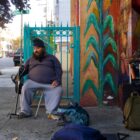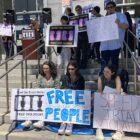 Transit chief Nathaniel Ford and Muni are on the clock.
Transit chief Nathaniel Ford and Muni are on the clock.
The Board of Supervisors’ budget committee ended a seven- hour meeting Wednesday by telling the Municipal Transit Agency (MTA) to revise its budget to satisfy complaints from supervisors and the public or risk having the full board reject it Tuesday — an unprecedented action.
Facing a $129 million budget shortfall, the San Francisco Municipal Railway has proposed record fare hikes and service cuts, sparking public outcry and a showdown between Mayor Gavin Newsom and the board. While several supervisors have acknowledged that some level of fare hikes and service cuts may be inevitable given the MTA’s dire financial situation, the major sticking point is the issue of "work orders" — reimbursements sent to Muni by other city departments to the tune of nearly $66 million.
On April 21, Board of Supervisors President David Chiu introduced legislation to reject Muni’s $765.6 million budget, saying the agency had not adequately vetted these bills from city departments for such services as traffic control, the 311 information center and hospitals visits stemming from Muni accidents. Nine days later, the MTA board approved Muni’s budget, but Chiu hasn’t been swayed.
"To raise fares and to cut services while millions of dollars from the MTA are still be used to fund other departments is just a really bitter pill to swallow," he said in an interview this week. "For San Franciscans to get charged more for less service at the same time that the MTA is not spending its dollars on core transit service is just not acceptable."
SFPD reimbursements
At Wednesday’s budget committee meeting, Chiu interrogated Ford, the MTA’s executive director, over work-order reimbursements. They included the police department’s patrol of city-owned garages and its traffic control efforts, both of which Chiu characterized as services the police perform for all of San Francisco.
"When police pass by other private properties like Macy’s, the owners of those properties are not charged a protection fee," Chiu said. He also noted the $1.96 per-call charge Muni pays for its 311 information service, a bill that adds up to $7 million per year.
Chiu’s four colleagues on the budget committee echoed his concerns. Supervisor Bevan Dufty said that the "police department has bullied Muni" into paying for some services for which it has no accountability.
The committee agreed to send along to the full Board of Supervisors a resolution to reject the Muni budget Tuesday, with an amendment that allows Ford and his staff to come up with a revised budget in the meantime. The changes would likely focus on about $25 million in combined cost savings and revenue that Chiu said he had identified, which could help Muni reduce the deficit and restore some service.
It would take at least seven of the 11 supervisors to reject the agency’s budget. Chiu has garnered six co-sponsors to his resolution — Supervisors David Campos, Ross Mirkarimi, Eric Mar, Chris Daly, John Avalos and Sophie Maxwell. Such a move would be unprecedented and could require the seven-member Muni board, which was appointed by Newsom, to revise it. If a final budget is not approved by July 1, when most of the proposed fare hikes would go into effect, the supervisors might be forced to allocate as much as $30.3 million from the city’s general fund to maintain service without raising fares or eliminating routes.
Newsom’s office did not return requests for comment.
Dufty isn’t sure how the showdown will be resolved. "There are a lot of pieces in this budget and I’m certainly not satisfied with all of them," he said in an interview this week. "But I’m not sure where we’re going to wind up."
At an April 30 MTA board meeting, Ford said his agency faced an economic situation that was the most "dire in more than a generation," arguing that the MTA "had no recourse" but to raise fares and cut service during a deep recession.
Fare hikes and service cuts
Barring the supervisors’ rejection of the budget, the basic adult bus and streetcar fare will jump 50 cents, to $2, the largest single raise in nearly a century. The increase is projected to raise an additional $14 million a year. Discounted cash fares for seniors, the disabled and youths also will go up, and the basic adult monthly pass will increase to $55 on July 1 and $60 on Jan. 1. Those increases will bring in an additional $7.2 million annually.
The proposed service cuts will affect about half the system’s 80 lines by reducing service hours, shortening some lines and eliminating others. Routes slated to be discontinued include the 4 Sutter, 7 Haight, 16AX Noriega morning express, 20 Columbus, 26 Valencia, 53 Southern Heights, 74X CultureBus and the 89 Laguna Honda. In all, 162,000 service hours will be eliminated.
To soften some of the blow, the board proposed increasing the frequency of and altering the routes running near the discontinued lines.
Muni’s Transit Effectiveness Project, a massive, system-wide study of rider use, served as a blueprint in crafting the cuts, and Ford said the changes would be monitored closely for impact.
"This is really an anti-rider budget," said Tom Radulovich, executive director of Livable City, which advocates for transportation and land-use planning changes in San Francisco.
Dufty said the moves are particularly disconcerting given Muni’s recent improvements in on-time performance. In 1999, voters mandated that Muni be on time 85 percent of the time, a mark it has yet to attain. On Tuesday, Ford announced that for the first three months of 2009, Muni had achieved a record-high 74.5 percent on-time performance rate, up from 72.7 percent in the previous quarter.
"That’s a demonstration that with resources, they can move things in the right direction," Dufty said. "We should be at 85 percent, but it is the highest we have reported."
But city officials concede that cuts and fare hikes were likely inevitable given Muni’s dire budget situation. Although decreased revenues and rising expenses can be found throughout the Muni system, it was hit hardest by the budget compromise worked out between Gov. Arnold Schwarzenegger and the state legislature in mid-February. The deal diverted all $536 million of the State Transit Assistance (STA) funding to subsidize transit operations to the state’s General Fund. The move left Muni’s coffers $68 million lighter — $25 million this year and $43 million next year.
"Without a doubt, it is criminal what we have done to transit at the state level," state Sen. Mark Leno said in an interview this week. "Under Arnold Schwarzenegger’s leadership, we have really robbed the funds that were intended for public transit. Now more than ever we should be investing in it, not cutting it."
‘Work orders’ drain Muni
Adding to Muni’s woes is the recession-driven decline in the city’s annual revenue from advertising on its buses and bus shelters, which has fallen 31 percent to, $13.8 million.
But what has really raised temperatures at City Hall is the millions of dollars that other departments bill Muni for various services in the form of "work orders."
"Are we just robbing Peter to pay Paul?" asked MTA board member Jerry Lee at an April 7 budget hearing.
The police department had asked the MTA for a reimbursement of $18 million in the upcoming fiscal year, nearly double the amount from a few years ago. The move left Daniel Murphy, head of the MTA’s Citizens’ Advisory Council, perplexed at the MTA’s April 30 meeting. "Uniformed police presence on Muni is nearly nonexistent," he said.
The MTA and the police department have been in ongoing negotiations over the issue. The parties recently reached a deal that would give the MTA more control over the San Francisco Police Department’s "traffic company." The detail of more than 80 uniformed officers is responsible for keeping streets and dedicated bus lanes unobstructed.
The SFPD has also agreed to reduce its work order by $2 million.
These negotiations are ongoing, and we are hoping for a reasonable outcome," said spokesman Sgt. Wilfred Williams.
Although the details are still being worked out between Muni and the police , Dufty said he has been in talks on starting a pilot program to get police officers riding the Muni system.
"It’s a work in progress," Dufty said. "But I am encouraged that Muni will have decision-making power over the traffic company of the SFPD."
Budget woes nationwide
Muni is by no means alone in its budget woes. According to David Goldberg of Transportation for America, a public transit advocacy group, more than 80 local and regional transit systems are facing serious budget deficits.
"Transit is an essential service, and in times like this people really need for it to remain affordable and can’t have their livelihood threatened by a commute that suddenly becomes longer, harder and more expensive," he said. "It is deeply ironic and tragic that this is happening at the time when transit demand in this country is at a 50-year high."
Chiu and Dufty were part of a local contingent that visited Washington, D.C., in March to lobby for sending stimulus dollars. But those discussions centered solely on capital projects, such as replacing Doyle Drive, renovating Terminal 2 at San Francisco International Airport and building the Transbay Terminal. They did not focus on operational expenses for Muni.
The federal transportation authorization bill, which pays for transit and highway projects over a 6-year period, expires on Sept. 30, and Rep. James Oberstar (D-Minn.), the chair of the House Transportation and Infrastructure Committee, is expected to introduce a renewal bill within a few weeks. Oberstar’s bill would provide the first opportunity for legislators to discuss transit priorities for the next six years. Goldberg said one option is to give local transit agencies like Muni the ability more flexibility in using federal transit dollars.
Muni has seized on some stimulus funds in the American Recovery and Reinvestment Act of 2009. The agency is eligible to receive $67 million to renovate, repair and maintain its fleet of buses and infrastructure. Muni put out bids for that work to vendors earlier this week.
But given the state’s dire budget situation and the federal government’s focus on using the bulk of the stimulus money for capital improvements as opposed to day-today operational expenses, Chiu said Muni has a tough task ahead. Almost every transit agency in the Bay Area has either already raised fares or is debating how much to raise them.
"We’re really stuck to deal with this problem on our own," he said. "It is inevitable that we have to consider certain fare increases and service cuts, but we need to do it in a context where we know that every single penny that Muni is spending is being spent on core transit services and that’s just simply not the case right now."
The road ahead
Although the Board of Supervisors must approve or reject the MTA budget in its entirety, it could send it back to the agency with recommendations. In addition to the efforts on work orders, one possible compromise could see the inclusion of Sunday and evening parking meter enforcement, which would generate $13.6 million in revenue for the MTA. The increased enforcement had been included in prior iterations of the budget but was nixed at the urging of the mayor’s office, Dufty, and Supervisor Carmen Chu.
The MTA is also eyeing additional revenue sources that it cannot enact until later this year, including adding a $3 courthouse fee to all citations, a move that would generate $4.2 million a year, as well as a ballot measure that would add a tax on cars rented at San Francisco International Airport. "We should be encouraging visitors to use our public transit resources," MTA board member Malcolm Heineke said.
Radulovich suggests a ballot measure that would close a loophole in the city’s parking tax policy that exempts valet parking facilities from paying the city’s parking tax. Such a move could generate $4 million a year, he said."It’s hard to see cutting service for low-income folks but not letting valet parking pay parking tax," he said.
Chiu and state Sen. Mark Leno also point to the possibility that San Francisco could find additional transit funding through a hike in Vehicle License Fees (VLF) locally. The fees, applied to registered automobiles each year, have long been the subject of a tug-of-war between the state and counties. In the upcoming May 19 election, Prop. 1A, would amend the state Constitution to increase a "rainy day fund" and to extend $16 billion in temporary increases in the state’s sales tax, income tax, and VLFs.
Leno has proposed a separate bill, SB10, that would give local governments the authority to raise their own VLFs. If it passed and was signed by the governor, Chiu could proceed with an ordinance to take a VLF increase to the voters via a ballot measure.
"All we are asking for is the opportunity for San Francisco voters to decide for ourselves if this is something that we do," Chiu said. "If we get that green light, I know there is significant support from a variety of divergent stakeholders to move forward with a VLF increase in San Francisco during these tough times."
In the short term, Ford and the MTA board must come up with a budget that satisfies the Board of Supervisors, or risk a messy tussle.
"I have confidence that hopefully we can reach some resolution," Dufty said.










